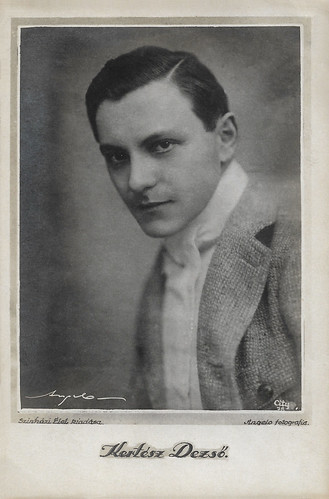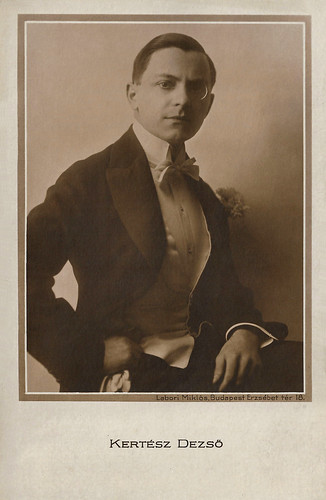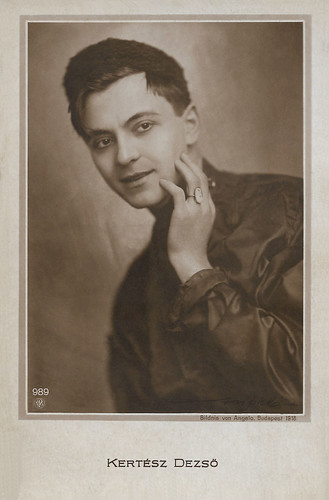Dezső Kertész (1890-1965) was a Hungarian stage and screen actor and theatre director. He acted in some 7 silent Hungarian films in the 1910s and returned to the set in the early sound era and the war years. After the war, he was sentenced to silence.

Hungarian postcard by Shinhasi Elat Kiadasa, no. 78. Photo: Angelo, Budapest / City.
Dezső Kertész or Desider Kertesz was born in 1890 in Békés, Hungary. He was the son of Gábor Kertész and Ida Kelemen. He graduated from his school in Arad and then was taught by Imre Pethes in Budapest. He was first a member of Ignác Krecsányi's company. Between 1908 and 1909 he was an actor in Arad. Between 1909 and 1911 Kertész played in Győr. Between 1911 and 1912 he performed in Sopron.
Between 1912 and 1914 he was a member of the Buda-Timisoara company. In 1914 he also performed in Bratislava and Szombathely, and between 1915 and 1926 he was - with interruptions - a member of the Vígszínház (Comedy Theatre of Budapest). Dezső Kertész debuted on screen as the Baron's son Laszlo in the silent drama A Falu rossza/The Village Rogue (Miklós Pásztory, 1916), based on a play by Ede Tóth, and scripted by Ladislaus Vajda.
He then played opposite Ica Lenkeffy in the romantic film Szulamit (Jenö Illés, 1916), Dr. Gré in A Nevetö Szaszkia/The Laughing Saskia (Alexander Korda, 1916), and A szentjóbi erdö titka/The Secret of St. Job Forest (Michael Curtiz, 1917). In Három hét (Márton Garas, 1917), based on Elinor Glyn's 'Three Weeks', his co-star was Sári Fedák. She played an unhappily married Queen who steps out for three weeks with a dashing count (Kertész). Similarly, Kertész played the rich bachelor Vronsky in Anna Karenina (Márton Garas, 1918), an adaptation of Leo Tolstoy's novel with Irén Varsányi in the title role.
In 1919 he acted in A Táncosnö/The Dancer (Márton Garas, 1919) opposite Leopoldine Konstantin and in the thriller A 111-es/Number 111 (Alexander Korda, 1919) starring Gábor Rajnay and María Corda. The film was based on a novel by Jenő Heltai. It was director Korda's final Hungarian film before he went into exile in Austria during the White Terror. Kertész also had a supporting part in the Hungarian-Austrian silent horror film Drakula halála/Dracula's Death (Károly Lajthay, 1921), starring Paul Askonas. It marked the first screen appearance of the vampire Count Dracula (spelt 'Drakula'), although the film's plot did not at all follow the narrative of Bram Stoker's novel 'Dracula'.
After originally opening in Vienna in 1921 and enjoying a long and successful European run, Drakula halála was later re-edited and re-released in Budapest in 1923 as The Death of Dracula. The film was presumed to be a lost film but critic Troy Howarth states in his reference book 'Tome of Terror' that a print exists in a Hungarian archive. All in all, Dezső Kertész acted in some 18 silent Hungarian films until 1921.

Hungarian postcard by József Reinitz, Budapest. Photo: Miklós Labori, Budapest.
Dezső Kertész also directed silent films in Austria. The first was the fairy tale Rumpelstilzchen (Dezső Kertész, 1923), produced by Sascha-Film. It was followed by four more films in 1923-1924. Six years later he directed his last film, General Babka (Dezső Kertész, 1930), starring Wolf Albach-Retty, Angelo Ferrari and Mary Kid.
In 1929, Dezső Kertész married the actress Ilona Vaály in Terézváros, Hungary. From then on, he focused his career on the theatre. Between 1929 and 1932 he was a member of the King Theatre. Between 1933 and 1934 and between 1943 and 1944, he was working for the Budapest Operetta Theatre. Between 1934 and 1936 he was an actor at the Pest Hungarian Theatre. Between 1938 and 1940 he was the director of the Royal Theatre.
On-screen, Deszö Kertész acted in the Hungarian version of J.M. Barrie's 'The Doctor's Secret', Az orvos titka (Tibor Tibor Hegedüs, 1930) at the Paris Paramount studios. He also had a major part in the comedy Vica, a vadevezös/Vica the Wild Boar (Béla Gaál, 1933).
Between 1940 and 1941 Kertész played on stage in Sopron and Pécs. Between 1941 and 1942 he was an actor at the Szeged National Theatre. Between 1942 and 1943 he was a member of the Merry Stage. In 1945 he played on the stage of the Downtown Theatre. During the war years, he acted in three films, the comedy Estélyi ruha kötelezö/Evening dress compulsory (László Cserépy, Árpád Horváth, 1942), the drama Örségváltás/Changing the Guard (Viktor Bánky, 1942) starring Antal Páger, and Csalódás/Disappointment (Frigyes Bán, 1943).
From 1945 to 1951 Kertész was sentenced to silence. After the war, Kertesz had small parts in Hungarian films like the biopic Semmelweis (Frigyes Bán, 1952) and the short film Különös tárgyalás/Special Negotiation (Dezsõ Varasdy, 1961). Between 1953 and 1955 he was a member of Katona József Theatre in Kecskemét. From 1958 he was a member of the József Attila Theatre. Dezső Kertész died in 1965 in Budapest. He was 73.

German postcard by NPG, no. 989. Photo: Angelo, Budapest, 1918.
Sources: Wikipedia (Hungarian and English) and IMDb.
This post was last updated on 19 December 2024.

Hungarian postcard by Shinhasi Elat Kiadasa, no. 78. Photo: Angelo, Budapest / City.
A dashing count or a rich bachelor
Dezső Kertész or Desider Kertesz was born in 1890 in Békés, Hungary. He was the son of Gábor Kertész and Ida Kelemen. He graduated from his school in Arad and then was taught by Imre Pethes in Budapest. He was first a member of Ignác Krecsányi's company. Between 1908 and 1909 he was an actor in Arad. Between 1909 and 1911 Kertész played in Győr. Between 1911 and 1912 he performed in Sopron.
Between 1912 and 1914 he was a member of the Buda-Timisoara company. In 1914 he also performed in Bratislava and Szombathely, and between 1915 and 1926 he was - with interruptions - a member of the Vígszínház (Comedy Theatre of Budapest). Dezső Kertész debuted on screen as the Baron's son Laszlo in the silent drama A Falu rossza/The Village Rogue (Miklós Pásztory, 1916), based on a play by Ede Tóth, and scripted by Ladislaus Vajda.
He then played opposite Ica Lenkeffy in the romantic film Szulamit (Jenö Illés, 1916), Dr. Gré in A Nevetö Szaszkia/The Laughing Saskia (Alexander Korda, 1916), and A szentjóbi erdö titka/The Secret of St. Job Forest (Michael Curtiz, 1917). In Három hét (Márton Garas, 1917), based on Elinor Glyn's 'Three Weeks', his co-star was Sári Fedák. She played an unhappily married Queen who steps out for three weeks with a dashing count (Kertész). Similarly, Kertész played the rich bachelor Vronsky in Anna Karenina (Márton Garas, 1918), an adaptation of Leo Tolstoy's novel with Irén Varsányi in the title role.
In 1919 he acted in A Táncosnö/The Dancer (Márton Garas, 1919) opposite Leopoldine Konstantin and in the thriller A 111-es/Number 111 (Alexander Korda, 1919) starring Gábor Rajnay and María Corda. The film was based on a novel by Jenő Heltai. It was director Korda's final Hungarian film before he went into exile in Austria during the White Terror. Kertész also had a supporting part in the Hungarian-Austrian silent horror film Drakula halála/Dracula's Death (Károly Lajthay, 1921), starring Paul Askonas. It marked the first screen appearance of the vampire Count Dracula (spelt 'Drakula'), although the film's plot did not at all follow the narrative of Bram Stoker's novel 'Dracula'.
After originally opening in Vienna in 1921 and enjoying a long and successful European run, Drakula halála was later re-edited and re-released in Budapest in 1923 as The Death of Dracula. The film was presumed to be a lost film but critic Troy Howarth states in his reference book 'Tome of Terror' that a print exists in a Hungarian archive. All in all, Dezső Kertész acted in some 18 silent Hungarian films until 1921.

Hungarian postcard by József Reinitz, Budapest. Photo: Miklós Labori, Budapest.
Six years sentenced to silence
Dezső Kertész also directed silent films in Austria. The first was the fairy tale Rumpelstilzchen (Dezső Kertész, 1923), produced by Sascha-Film. It was followed by four more films in 1923-1924. Six years later he directed his last film, General Babka (Dezső Kertész, 1930), starring Wolf Albach-Retty, Angelo Ferrari and Mary Kid.
In 1929, Dezső Kertész married the actress Ilona Vaály in Terézváros, Hungary. From then on, he focused his career on the theatre. Between 1929 and 1932 he was a member of the King Theatre. Between 1933 and 1934 and between 1943 and 1944, he was working for the Budapest Operetta Theatre. Between 1934 and 1936 he was an actor at the Pest Hungarian Theatre. Between 1938 and 1940 he was the director of the Royal Theatre.
On-screen, Deszö Kertész acted in the Hungarian version of J.M. Barrie's 'The Doctor's Secret', Az orvos titka (Tibor Tibor Hegedüs, 1930) at the Paris Paramount studios. He also had a major part in the comedy Vica, a vadevezös/Vica the Wild Boar (Béla Gaál, 1933).
Between 1940 and 1941 Kertész played on stage in Sopron and Pécs. Between 1941 and 1942 he was an actor at the Szeged National Theatre. Between 1942 and 1943 he was a member of the Merry Stage. In 1945 he played on the stage of the Downtown Theatre. During the war years, he acted in three films, the comedy Estélyi ruha kötelezö/Evening dress compulsory (László Cserépy, Árpád Horváth, 1942), the drama Örségváltás/Changing the Guard (Viktor Bánky, 1942) starring Antal Páger, and Csalódás/Disappointment (Frigyes Bán, 1943).
From 1945 to 1951 Kertész was sentenced to silence. After the war, Kertesz had small parts in Hungarian films like the biopic Semmelweis (Frigyes Bán, 1952) and the short film Különös tárgyalás/Special Negotiation (Dezsõ Varasdy, 1961). Between 1953 and 1955 he was a member of Katona József Theatre in Kecskemét. From 1958 he was a member of the József Attila Theatre. Dezső Kertész died in 1965 in Budapest. He was 73.

German postcard by NPG, no. 989. Photo: Angelo, Budapest, 1918.
Sources: Wikipedia (Hungarian and English) and IMDb.
This post was last updated on 19 December 2024.
No comments:
Post a Comment